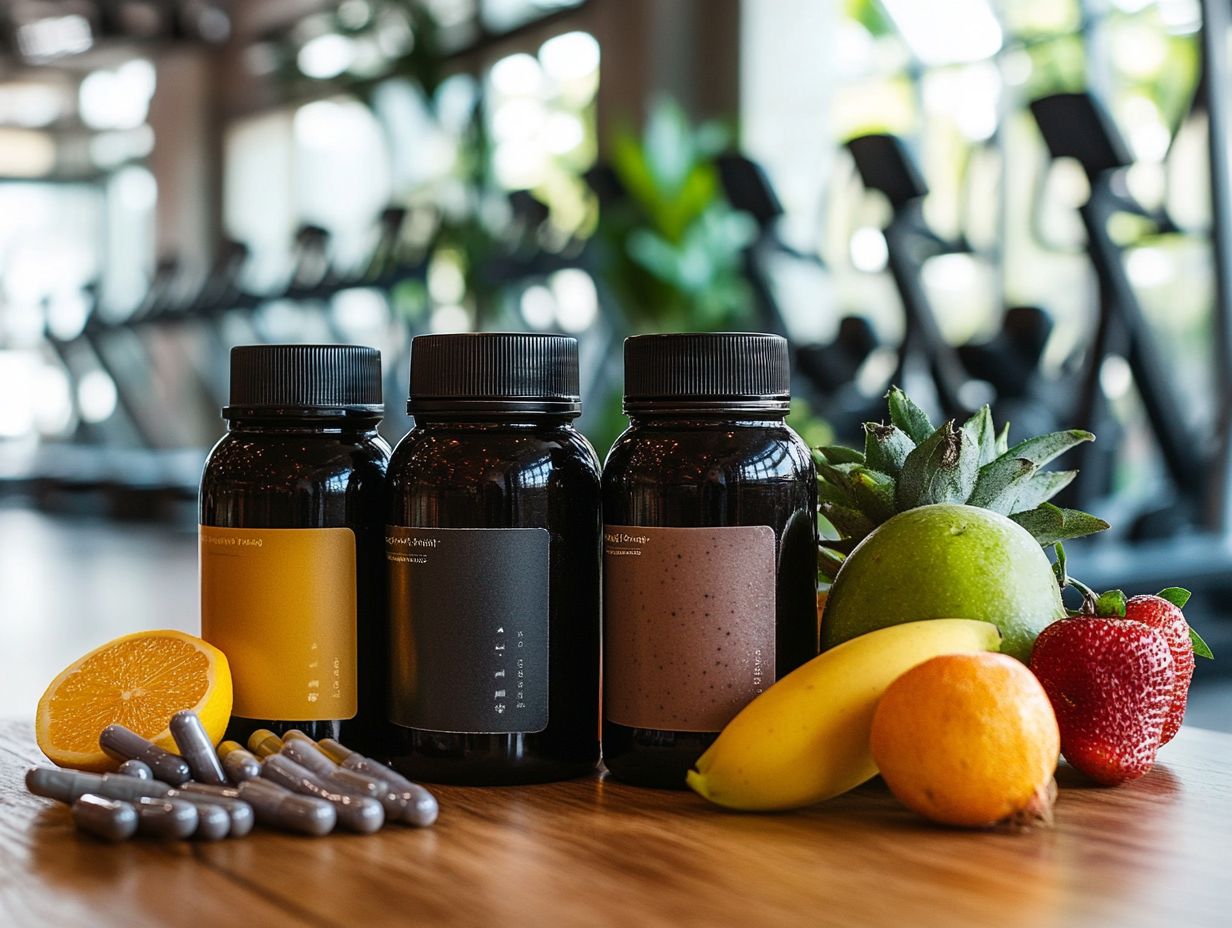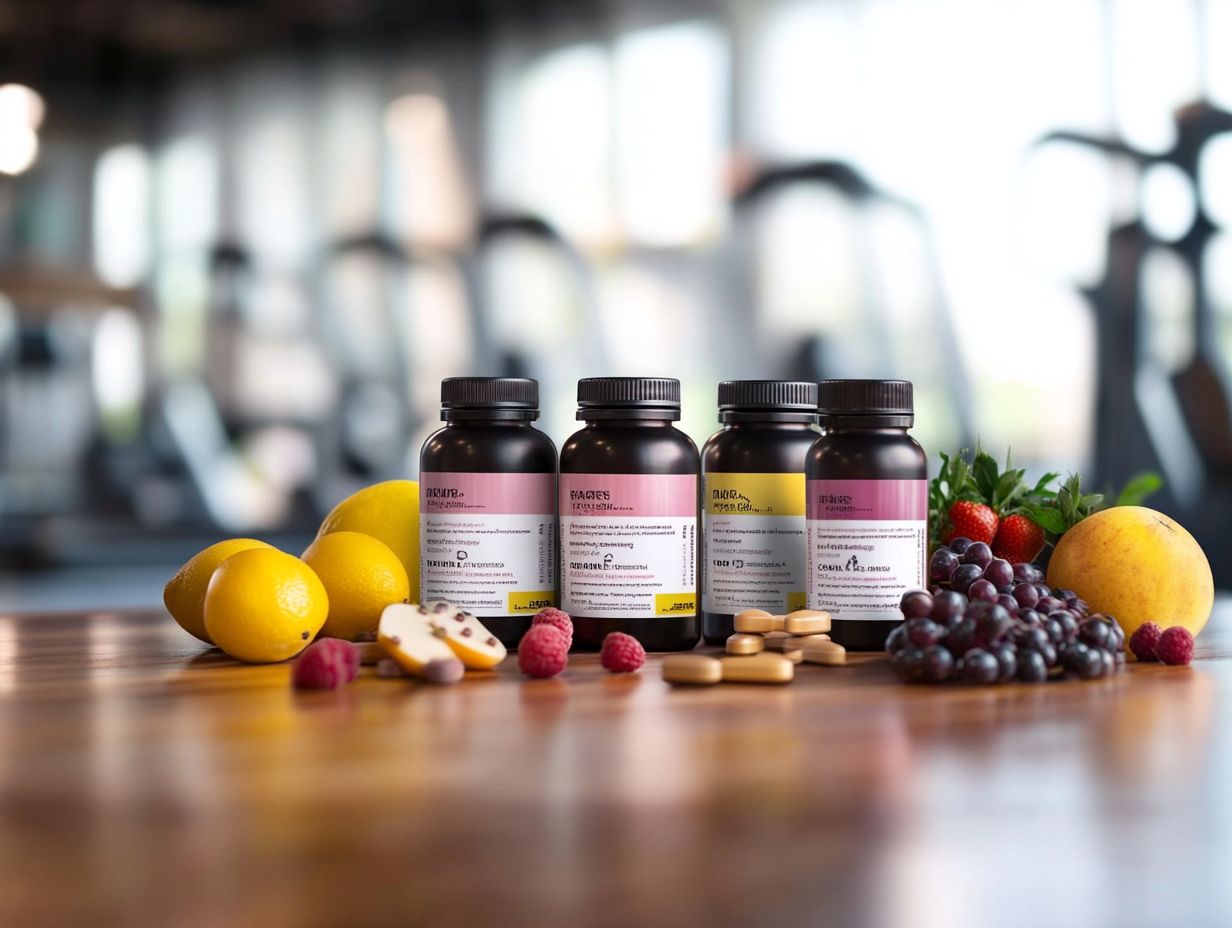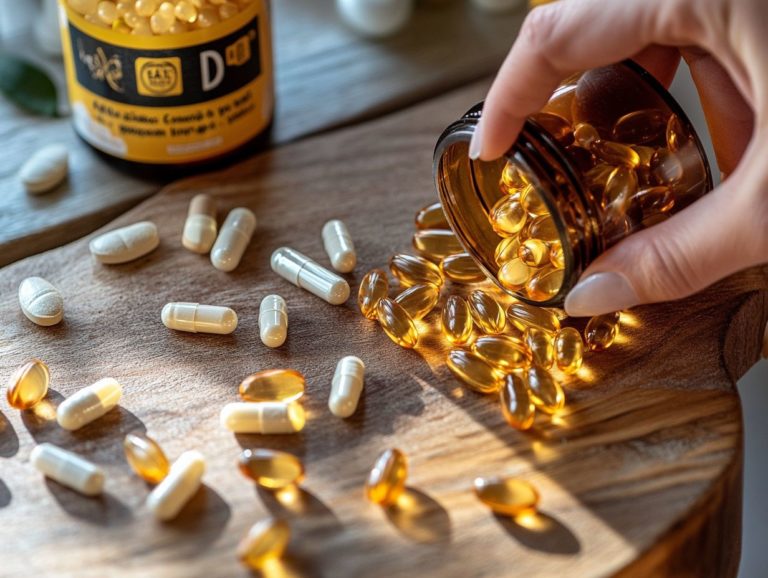5 Essential Supplements for Improved Athletic Recovery
Athletic recovery is an essential component of your training regimen, enabling your body to heal and grow stronger after those intense workouts.
With a myriad of supplements on the market, it can feel daunting to determine which truly support your recovery.
Get ready to learn how to use them effectively to supercharge your recovery! This article delves into five crucial supplements Protein Powder, BCAAs, Creatine, Glutamine, and Omega-3 Fatty Acids that can significantly enhance your recovery process.
You ll also discover potential side effects to be aware of and tips for selecting the right options tailored to your specific needs.
Whether you re a seasoned athlete or a weekend warrior, understanding these supplements can empower you to optimize your performance and overall well-being.
Contents
- Key Takeaways:
- 1. Protein Powder
- 2. BCAAs (Branched-Chain Amino Acids)
- 3. Creatine
- 4. Glutamine
- 5. Omega-3 Fatty Acids
- What Is Athletic Recovery and Why Is It Important?
- Frequently Asked Questions
- What are the 5 essential supplements for improved athletic recovery?
- Why is protein important for athletic recovery?
- What are BCAAs and how do they aid in athletic recovery?
- How does creatine benefit athletic recovery?
- Why are omega-3 fatty acids important for athletes?
- How does vitamin D play a role in athletic recovery?
Key Takeaways:

- Protein powder helps repair muscle tissue and aids in rebuilding muscle after intense workouts.
- BCAAs help reduce muscle soreness and fatigue, allowing for faster recovery and improved performance.
- Creatine boosts muscle strength and endurance, leading to better athletic performance and faster recovery.
1. Protein Powder
Protein powder is an essential supplement for athletes. It significantly aids in muscle recovery and growth.
It provides vital amino acids that enhance the process that helps muscles rebuild after your workouts, ultimately boosting your athletic performance and reducing muscle soreness.
You’ll find a variety of protein powders on the market, including whey, casein, soy, and pea protein, each offering distinct benefits to suit your dietary needs and workout goals.
For example, whey protein is rapidly absorbed, making it perfect for immediate post-workout consumption to jumpstart your recovery. On the other hand, casein releases amino acids slowly, making it an excellent choice for nighttime use.
By incorporating protein powder into your regimen, you’re not just repairing and building muscle fibers; you’re also helping to maintain a positive balance of nutrients your body needs.
It’s advisable to consume your protein powder within 30 minutes after exercising, as this window maximizes the benefits of muscle recovery and fosters overall growth.
2. BCAAs (Branched-Chain Amino Acids)
BCAAs help reduce muscle damage and perceived fatigue during high-intensity workouts. This ultimately enhances your performance and recovery.
These amino acids leucine, isoleucine, and valine play a vital role in muscle protein synthesis and recovery, making them especially advantageous for athletes engaged in demanding training regimens.
By promoting muscle repair, BCAAs can significantly minimize soreness and accelerate your recovery after rigorous workouts.
For optimal effectiveness, it’s often recommended that you consume around 5-10 grams of BCAAs before or during your exercise sessions. This timing can be particularly beneficial for boosting endurance and reducing muscle breakdown.
Taking BCAAs post-workout can further support recovery, ensuring your muscles receive the nutrients they need to heal and grow stronger.
3. Creatine
Creatine is a well-researched supplement celebrated for its remarkable ability to boost muscle growth and enhance energy production during high-intensity exercise, ultimately elevating your overall performance and recovery.
Upon consumption, creatine transforms into phosphocreatine, which plays a vital role in regenerating adenosine triphosphate (ATP) the primary energy carrier in your cells.
This process becomes especially critical during short bursts of intense activities, like sprinting or heavy lifting.
Research indicates that regular supplementation can lead to substantial increases in both muscle mass and strength, primarily due to enhanced workout capacity and improved recovery times.
Common recommendations suggest a daily dosage ranging from 3 to 5 grams to maintain muscle saturation. For those seeking to amplify athletic performance, creatine monohydrate is often considered the gold standard.
Start incorporating these supplements today and elevate your recovery game!
4. Glutamine

Glutamine is a building block of protein that helps your muscles recover and supports your immune system during tough training sessions.
This compound can replenish energy in your muscles. It improves performance and endurance, allowing you to train harder with less soreness.
To get the most out of glutamine, take it soon after your workouts. Whether in powder form or in a meal, timing is key for recovery.
5. Omega-3 Fatty Acids
Omega-3 fatty acids, often found in fish oil, are crucial for reducing inflammation and easing joint pain after exercise.
You can also get them from foods like flaxseeds, chia seeds, and walnuts even if you don t eat fish. These acids not only help your joints but also boost muscle recovery and reduce stress in your body.
For optimal benefits, aim for a daily intake of 1 to 3 grams of combined EPA and DHA, the two key types of omega-3s. Understanding these sources highlights how vital omega-3s are for enhancing your athletic performance and overall health.
What Is Athletic Recovery and Why Is It Important?
Athletic recovery is essential for restoring your body to its pre-exercise state. It involves various strategies that optimize performance, alleviate muscle soreness, and maintain physical health.
This phase allows your body to repair muscle fibers, replenish energy stores, and regulate essential processes, including inflammation and hormone balance.
Ignoring recovery can lead to fatigue, decreased performance, and increased injury risk. Your body needs time to recover before the next workout.
Implement key tactics like nutrient timing plan your intake of carbohydrates and proteins after exercise to maximize muscle repair and growth. Proper hydration also supports metabolic functions and cognitive performance.
Prioritizing recovery can supercharge your athletic performance and keep you in the game longer!
How Do These Supplements Aid in Athletic Recovery?
Various supplements are vital for enhancing your recovery. For athletes, knowing the top dietary supplements can help reduce muscle soreness, boost protein synthesis, and improve hydration.
For instance, incorporating branched-chain amino acids (BCAAs) can significantly reduce muscle damage after intense workouts. Creatine replenishes energy stores, enhancing recovery.
Electrolytes help maintain fluid balance, which is key for optimal muscle function.
To truly reap the rewards, adopt a personalized approach to sports nutrition that considers your individual needs and recovery goals. This tailored regimen ensures you effectively harness these supplements for peak performance.
When Should These Supplements Be Taken?

The timing of taking supplements is essential for maximizing your recovery metrics. Certain supplements deliver optimal benefits when used before, during, or after exercise, perfectly aligning with dietary strategies tailored to your needs.
By planning when to introduce specific nutrients, you can support your muscles more effectively and enhance your overall performance. For instance, pre-workout supplements typically focus on boosting energy and endurance, helping to fuel your body and optimize your workouts.
During workouts, intra-workout options sustain energy levels and provide hydration through intense sessions. The post-workout phase is the prime moment to consume recovery-focused supplements, as your body is eager to repair and rebuild muscle tissues.
Integrating these timing strategies into your daily nutrition plan can lead to improved recovery and ultimately, better long-term fitness outcomes.
What Are the Potential Side Effects of These Supplements?
Be aware! Some side effects might surprise you. While supplements can provide substantial benefits for your recovery and performance, it’s crucial to understand the potential side effects that may stem from improper use or overconsumption. Ensuring safety and efficacy in supplementation is key.
Common side effects linked to popular supplements like creatine can include gastrointestinal discomfort or muscle cramping. Excessive vitamin D can cause high calcium levels in the blood. To minimize these risks, adhere to recommended dosages, stay properly hydrated, and consider cycling your supplement intake.
Discussing any new supplementation plans with a healthcare professional is essential. They can provide personalized advice tailored to your unique health conditions, dietary restrictions, and specific fitness goals, ultimately promoting a safer approach to enhancing your performance.
Are These Supplements Safe for Everyone?
The safety of supplements can vary significantly from person to person. Evaluate your health conditions and consult a functional medicine practitioner to ensure that any supplementation you consider is both appropriate and beneficial.
Numerous factors influence whether a specific supplement is safe for you. For instance, your age plays a critical role in how your body metabolizes different substances; older adults often experience different absorption rates and potential side effects compared to younger counterparts.
Pre-existing health conditions, such as diabetes or heart disease, can impact how supplements interact with your overall health and treatment plans. The possibility of supplements interacting with prescribed medications adds another layer of risk, highlighting the importance of a personalized approach.
By tailoring supplementation to your unique health profile, you can maximize benefits while minimizing potential harm.
How Can One Determine Which Supplements Are Right for Them?
Determining which supplements are right for you requires a personalized approach that considers your training volume, dietary intake, and specific recovery needs.
Start by assessing your fitness goals, whether you aim for muscle gain, endurance, or enhanced recovery. Consider consulting a nutritionist or healthcare professional who can offer tailored insights and recommendations based on your unique lifestyle and nutritional requirements.
Consistently reviewing feedback from your recovery metrics such as muscle soreness levels and overall performance will help you fine-tune your supplement choices. This way, you can ensure they align with your evolving fitness objectives and support your physical well-being.
Frequently Asked Questions

Ready to enhance your performance? Consult a healthcare provider and start your supplementation journey today!
What are the 5 essential supplements for improved athletic recovery?
Discover the 5 superfoods for post-workout recovery that can supercharge your athletic recovery today! They are protein, BCAAs, creatine, omega-3 fatty acids, and vitamin D.
Why is protein important for athletic recovery?
Protein helps repair and grow muscles, which is vital for athletes. It also reduces muscle soreness and speeds up recovery after intense workouts.
What are BCAAs and how do they aid in athletic recovery?
BCAAs are a group of three amino acids that your body needs. They stimulate muscle repair and help reduce fatigue during exercise.
How does creatine benefit athletic recovery?
Creatine replenishes ATP, the energy source for muscle contractions. It also supports muscle repair and growth, making it essential for recovery.
Why are omega-3 fatty acids important for athletes?
Omega-3 fatty acids help reduce inflammation. They promote faster recovery and support joint health.
How does vitamin D play a role in athletic recovery?
Vitamin D is a powerhouse for strong bones and muscles! It helps regulate inflammation and boosts immune function, aiding recovery after tough training.






